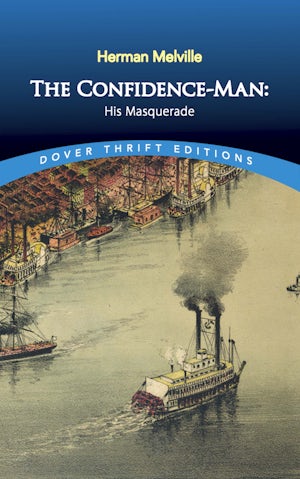1. A Mute Goes Aboard a Boat on the Mississippi
2. Showing That Many Men Have Many Minds
3. In Which a Variety of Characters Appear
4. Renewal of Old Acquaintance
5. The Man with the Weed Makes It an Even Question Whether He Be a Great Sage or a Great Simpleton
6. At the Outset of Which Certain Passengers Prove Deaf to the Call of Charity
7. A Gentleman with Gold Sleeve-Buttons
8. A Charitable Lady
9. Two Business Men Transact a Little Business
10. In the Cabin
11. Only a Page or So
12. Story of the Unfortunate Man, from Which May Be Gathered Whether or No He Has Been Justly So Entitled
13. The Man with the Traveling-Cap Evinces Much Humanity, and in a Way Which Would Seem to Show Him to Be One of the Most Logical of Optimists
14. Worth the Consideration of Those to Whom It May Prove Worth Considering
15. An Old Miser, upon Suitable Representation, Is Prevailed upon to Venture an Investment
16. A Sick Man, After Some Impatience, Is Induced to Become a Patient
17. Towards the End of Which the Herb-Doctor Proves Himself a Forgiver of Injuries
18. Inquest into the True Character of the Herb-Doctor
19. A Soldier of Fortune
20. Reappearance of One Who May Be Remembered
21. A Hard Case
22. In the Polite Spirit of the Tusculan Disputations
23. In Which the Powerful Effect of Natural Scenery Is Evinced in the Case of the Missourian, Who, in View of the Region Round About Cairo, Has a Return of His Chilly Fit
24. A Philanthropist Undertakes to Convert a Misanthrope, but Does Not Get Beyond Confuting Him
25. The Cosmopolitan Makes an Acquaintance
26. Containing the Metaphysics of Indian-Hating, According to the Views of One Evidently Not So Prepossessed as Rousseau in Favor of Savages
27. Some Account of a Man of Questionable Morality, but Who, Nevertheless, Would Seem Entitled to the Esteem of That Eminent English Moralist Who Said He Liked a Good Hater
28. Moot Points Touching the Late Colonel John Moredock
29. The Boon Companions
30. Opening with a Poetical Eulogy of the Press, and Continuing with Talk Inspired by the Same
31. A Metamorphosis More Surprising Than Any in Ovid
32. Showing That the Age of Magic and Magicians Is Not Yet Over
33. Which May Pass for Whatever It May Prove to Be Worth
34. In Which the Cosmopolitan Tells the Story of the Gentleman-Madman
35. In Which the Cosmopolitan Strikingly Evinces the Artlessness of His Nature
36. In Which the Cosmopolitan Is Accosted by a Mystic, Whereupon Ensues Pretty Much Such Talk as Might Be Expected
37. The Mystical Master Introduces the Practical Disciple
38. The Disciple Unbends, and Consents to Act a Social Part
39. The Hypothetical Friends
40. In Which the Story of China Aster Is, at Second-Hand, Told by One Who, While Not Disapproving the Moral, Disclaims the Spirit of the Style
41. Ending with a Rupture of the Hypothesis
42. Upon the Heel of the Last Scene, the Cosmopolitan Enters the Barber's Shop, a Benediction on His Lips
43. Very Charming
44. In Which the Last Three Words of the Last Chapter Are Made the Text of Discourse, Which Will Be Sure of Receiving More or Less Attention from Those Readers Who Do Not Skip It
45. The Cosmopolitan Increases in Seriousness

